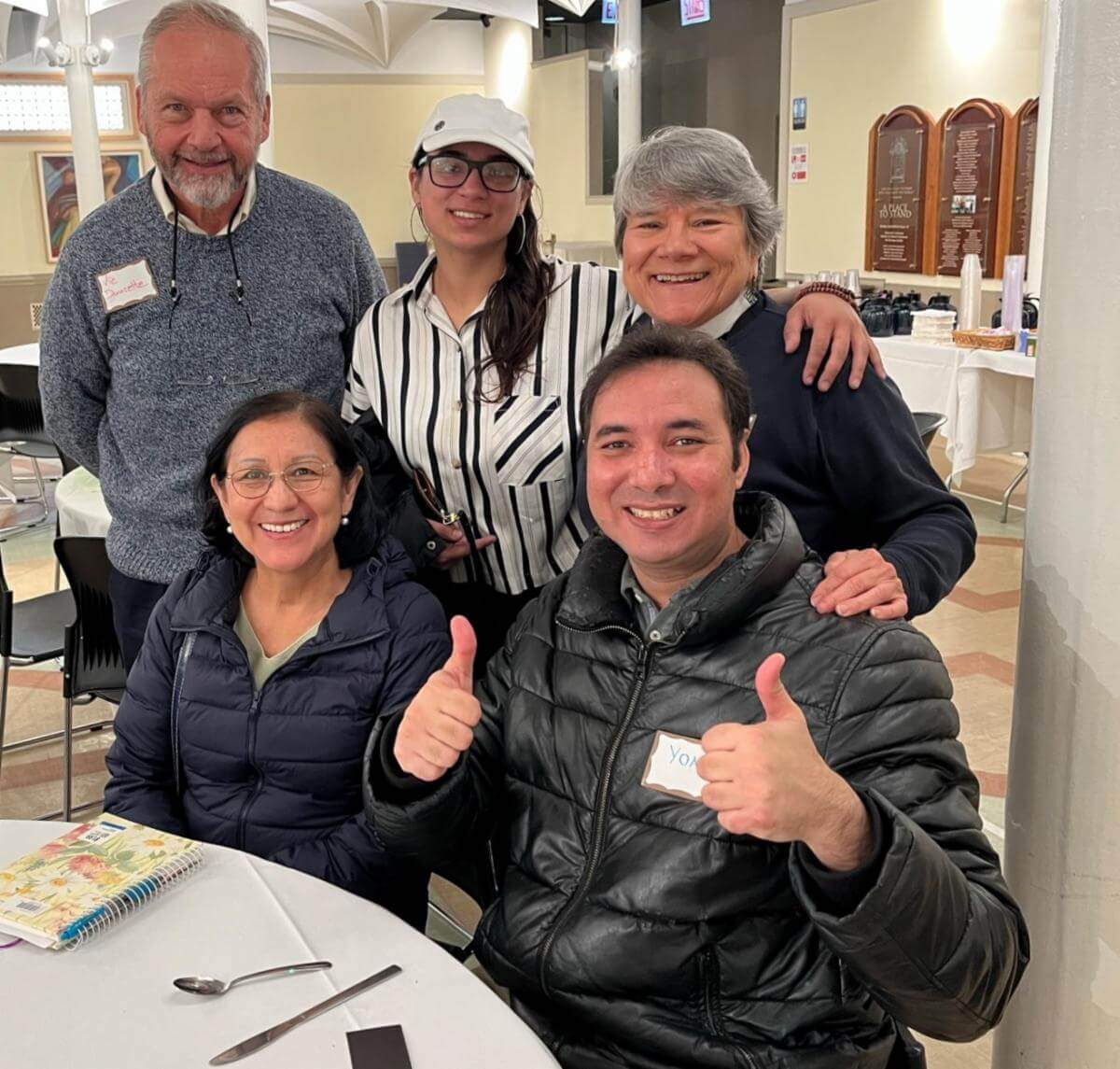
Sandra Castillo ’04 (r., rear) at a fundraiser for the Sanctuary Working Group, a network of churches and nonprofits that finds housing and case management services for asylum seekers.
Following the successful passage of Resolution F-182 “On Becoming a Sanctuary Diocese” at the 2019 convention, The Rev. Sandra Castillo (Seabury Western Class of 2004) organized the Diocese of Chicago Sanctuary Task Force, recruiting members, developing a work plan, and building relationships with other organizations. She organized training for committee members on immigration and sanctuary through the American Friends Service Committee and became the diocesan liaison with Illinois Coalition for Immigrant and Refugee Rights (ICIRR). Castillo was a recipient of the Diocese of Chicago S. Michael Yasutake Peace & Justice Award in 2020.
Castillo’s commitment to the work of justice began early in her career. She served as a liaison to Juvenile Court for the Illinois Department of Children and Family Services before receiving her law degree from DePaul University in 1981. Afterwards she worked as an assistant state attorney in Cook County, and as assistant attorney general in the Illinois Attorney General’s office. In 1996, she opened her own law practice and in 1999 joined the Inspector General’s office of the Chicago Board of Education as a case manager.
Castillo received her Master of Divinity degree from Seabury-Western Theological Seminary and was ordained a priest in 2004. After and serving parishes in the Dioceses of Chicago, Western Michigan, Eau Claire and Oklahoma, she returned to Chicago as a supply priest, and currently serves as an assisting priest at Santa Teresa de Avila in Chicago.
Castillo has served as a board member of Illinois Action for Children, of St. Augustine College and of the Immigration Committee Chair of the Logan Square Neighborhood Association. She has also volunteered with the Chicago Legal Clinic. In the diocese, Castillo has chaired the Sanctuary Task Force and the Anti-Racism Commission and served on the Hispanic Affairs Committee and the Anti-Racism Commission.
She was a member of Episcopal Relief and Development’s board of directors, collaborated on the Episcopal Church’s 2009 Strategic Vision for Reaching Latinos and Hispanics, and served as a committee member of the Hispanic Scholarship Trust Fund.
by The Rev. Sandra Castillo, Seabury Western ’04
When my great grandmother, grandmother and mother arrived in Chicago, they were fleeing religious persecution. My great grandmother had participated in the Cristero Movement, a counter-revolution in reaction to the Mexican government’s restrictions on the Catholic Church. In Chicago, my family went from being well off and comfortable to my grandmother working in a factory as a seamstress. Yet, my grandmother found a way to host young men from Mexico until they were established in Chicago and self-supporting.
It was not until I entered Latino ministry that I fully realized the extreme degree to which immigration laws impact the daily lives and families of immigrants – speaking with an inconsolable undocumented woman, depressed that she could not return to Mexico as her mother approached death; accompanying a church member to see her brother in a detention center. At a church in Wisconsin, we hosted a group of over 20 distraught people whose co-worker had fallen into an electrical grid at their chicken processing plant and died. Touring a series of Wisconsin dairy farms, one owner explained that only immigrants were willing to take on the heavy labor required of dairymen. At an Oklahoma pork processing plant, a mostly refugee work force organized into teams with bilingual team leaders, processed the meat to feed our country. At Texas family detention centers, helping parents prepare for their credible fear interviews, hearing of the violence in their home countries, I fully realized the importance of ministry to immigrants.
We have many opportunities to show our gratitude to the immigrants who serve each of us and our country, many of whom risked their lives as essential workers during the pandemic to provide our food, our consumer goods, protect our health and well-being. Scripture, Jesus’ teachings, the baptismal covenant, all require us to strive for justice, peace and respect the dignity of all people. As a Sanctuary Diocese, the Diocese of Chicago provides a framework in which the Sanctuary Task Force assists congregations, Diocesan institutions, clergy and lay leaders to engage in the work of welcoming and protecting undocumented and other immigrants, refugees and asylum seekers.
With the arrival of over 32,000 asylum seekers in the Chicago metro area, all our Diocese’s churches and institutions can do something – clothing drives, lunch programs, volunteering with churches and non-profits, partnering with other faith communities to raise funds and house families such as Trinity Episcopal Church; St. John Episcopal Church; and St. Michael and All Angels Episcopal Church. Property owners can rent apartments to asylum seekers. Advocacy for the reform and restructuring of our immigration system, acknowledging immigrants’ contributions to our society, is essential. The key is to work through networks, reaching out to the broader community. Our opportunities for ministry are endless.
Castillo invites anyone who would like further information or to explore partnership opportunities with the Diocese of Chicago Sanctuary Task Force, to email her at sca652@yahoo.com.
